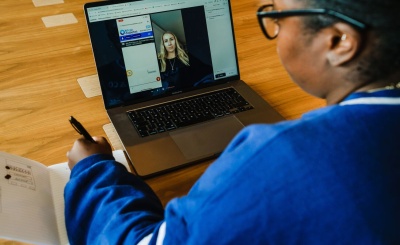
Conducting effective user research with HCPs
We asked our team of clinical UX researchers to share their advice for conducting user research with HCPs. Although all the standard user research best practice applies, there are a few other specific things to consider when your target user group are HCPs to make sure your research project runs smoothly.

- User Research
- HCP Engagement
- User Interviews
Conducting effective user research can be a tricky task. Even small-scale user research studies require considerable planning and rely on having access to quality research participants.
It’s probably no surprise then that conducting user research with healthcare professionals (HCPs) can be even trickier. HCPs are often difficult to access and time-poor, meaning that it’s naturally more difficult to identify them and incentivise them to participate in research.
However, HCPs are a fundamental part of the healthcare ecosystem and hold valuable insights from their day-to-day roles and interactions with patients and caregivers alike. This makes them crucial allies in designing effective digital health solutions and valuable assets to any digital health design process.
Here’s our phase-by-phase advice on how you can set yourself up to conduct efficient and effective user research with HCPs.
Phase 1: Planning and defining research
Planning your study
Before moving forwards and recruiting individuals for your research study, we must first be sure that the study is designed appropriately for use with HCPs. Ask yourself the following questions:
Do HCPs hold knowledge that is relevant to our problem space or use of our proposed solution?
Is the study design appropriate for answering our research questions?
Are research sessions of appropriate length? Remember, HCPs are time-poor so a 90-minute research session may deter some HCPs from taking part.
Will participants have the appropriate software required to participate? Some HCPs may use hospital networks and clinical devices that are unsuitable for remote user research.
If our study requires face-to-face research, do we have the appropriate regulatory clearance for site-visits at hospitals and clinics?
Identifying your HCPS
A user research study is only as good as it’s participants. Even the most meticulously planned study with rigid study design will fall flat with the wrong participants.
As with any study, you first need to have a clear outline of the participant profile that you plan to recruit. For the results of our studies to be valid, we need to recruit participants that either use the digital product (or a similar product) under study, or those that experience specific problems that we are studying. These are known as ‘target users’.
When carrying out research with HCPs you want to decide what type of professional you would like to study based on the insightsyou aim to gain. All HCP’s have different roles, thus their experiences and involvement in aspects surrounding the provision of care may differ. Consider things such as whether you are looking for doctors vs nurses? Are you looking for HCPs within a certain field or therapy area? A specific type of hospital or practising environment?
Narrow this down until you have a very specific participant profile for your sample so that you can be confident that your results are valid and are likely to reflect results observed in individuals that would be using your digital solution in the real world.
1:1 research sessions vs focus groups
1:1 research will always yield better results with improved validity than focus groups. Although gathering experts in a room together is excellent for conferences and scientific meetings, where the aim is to share learnings, they are a flawed method at uncovering true user needs or observing true-to-life behaviour and can be difficult to coordinate. This is because:
Group dynamics may mean that senior HCPs are more comfortable in talking about specific topics and experiences, and the voices of junior HCPs in the group may be lost
Social pressures and conformity behaviour may lead to some individuals claiming they do or not behave in specific way or hold specific attitudes so they better-fit into the group
The focus group is not a ‘safe space’ - some individuals may feel uncomfortable in speaking about sensitive issues in front of a group
Focus groups require all participants to be live in the same session; as we know, HCPs are time-poor and often all busy at different moments, making this hard to co-ordinate
Conversely, social influences are typically removed during 1:1 research sessions and a good research moderator is able to foster a better rapport with the participant than when in a group setting. The research session can be arranged at a convenient time for both research moderator and participants, and the session is a completely safe space where only the research moderator and research team will see any raw data.
Therefore, when conducting user research with HCPs select 1:1 study designs for the best results.

Phase 2: Recruitment
Availability of participants
As mentioned, HCPs tend to have busy schedules and work around different timings. Some will be working shift patterns, whilst others will have incredibly busy day-to-day schedules packed with appointments and consultations.
To allow yourself the opportunity to secure the required number of participants to research session, try to extend your availability for research session time slots as much as possible. If your research working hours are between 0900-1700, for example, try to extend to over lunch breaks, or out-of-hours to allow your participants flexibility to join. You can use online tools such as youcanbook.me to help you organise your sessions and allow HCP’s to book in time slots for themselves.
A reliable recruiter
To find HCPs that are specific to your brief you should use a trusted recruiter to identify those people. Recruiters are more likely to have a wider database of people that they can contact which will be more in line with your screener and saves you lots of time too!
It will be key to build a good relationship with an international specialist research recruiter — you may be working on products in overseas markets, so this is important. It may also be helpful to form direct relationships with healthcare organisations or hospitals.
You could begin to build a pool of HCP participants to re-engage with for future projects — just be mindful of re-using the same participants too frequently as this could skew insights and lead to biased design decisions.
Incentives
If you wish to conduct research sessions with healthcare professionals, you’ll need to ensure that you have the budget to do so. It follows ethics and best practice to appropriately compensate research participants for their time, so this should be taken into consideration when discussing things such as project plans and budgets.
This can be handled by a recruitment partner, or through your own assessment of average market rates for pay per hour — sometimes upwards of £150 per hour for consultant-level HCPs. Ensure that all participants are promptly reimbursed after their research session has been completed, generally within 48 hours.
Phase 3: Conducting the research
When running the user research sessions, all the usual best practices and standards will apply — asking open-ended questions with easy-to-understand language, following your discussion guide, building rapport with your interviewee to put them at ease, for example.
These are a couple of additional things to be mindful of when conducting research with HCP participants specifically.
Terminology
As researchers, we have the privilege of learning first-hand about many different areas of healthcare, but this knowledge is usually acquired over time and you may not always be familiar with medical terminologies at the time of running research sessions. This is ok! We are not the experts, and we are learning from HCPs along the way.
Preface sessions by letting the participant know you are not a specialist expert in the therapy area or problem space; let them know you will be probing from a place of curiosity and learning as opposed to challenging their knowledge.
Try to make time to learn some basic relevant terminologies before research sessions, but don’t be afraid to ask participants to explain what specific terminology or acronyms mean if you are unsure.
Session timings
Bare in mind that participants have taken time out of their day to attend a research session. Remind participants of the time allocated at the beginning of the session, then stick to it to avoid unnecessary disruption to their day. If it does look like you’ll run over slightly, respect their time and politely ask if they are able to stay.
Gain valuable insight to enable informed decision-making
Conducting first-hand user research with HCPs can provide valuable insight and enable evidence-based decision-making when it comes to the design of your digital products and services. These are a few things to keep in mind when planning and executing your research projects to ensure the process runs efficiently and get the most out of your research sessions.
If you're looking for an experienced partner to support you in executing user research with patients or HCPs in order to improve the success of your digital products and services, get in touch.
Want more on user research in digital pharma and healthcare?


How can pharma teams build trust with HCPs with their digital content and products?
- Pharmaceutical
- User research
- Customer Experience

Demonstrating the value of user research in pharma and healthcare
- Healthcare
- Pharmaceutical
- User research